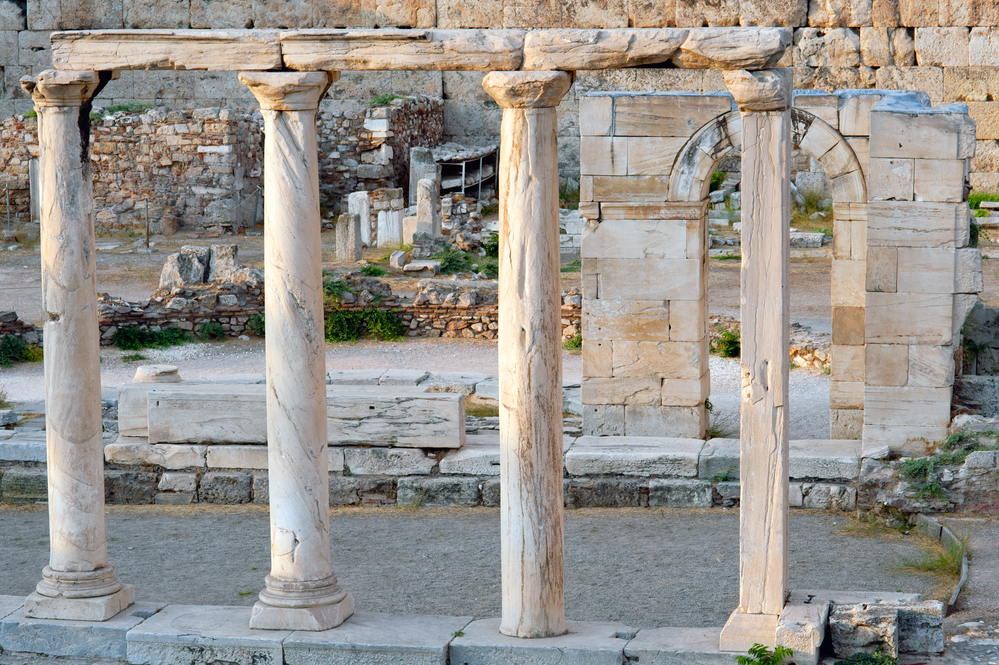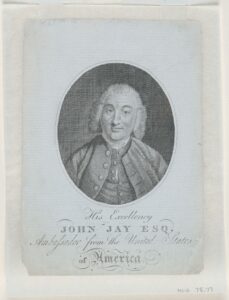
In previous posts (here and here), I introduced Hazony’s vision of conservatism is inextricably linked to the idea of nationalism. Now, that’s certainly a loaded word in today’s vernacular. “Nationalism” brings up images of jingoism, intolerance, and disdain for other people or cultures. But that’s clearly not what Hazony envisions from nationalism, particularly in light of his comment about the wisdom of respecting the laws and traditions of other nations. To Hazony, nationalism is an approach that puts the nation at the center of political life – and he thinks liberals have lost sight of what a nation really is.
According to the liberal paradigm, “the term ‘nation’ (or ‘people’) is merely a collective name for the individuals who live under the state. On this view, the nation comes into existence with the establishment of the state and is dissolved when the state is dissolved.” But to conservatives, “the nation is not the same thing as the government or the state that rules over it. A nation can and often does exist without any fixed government established over it, as was the case of the Greek city-states, whose citizens were well aware of the existence of a Greek ethnos or nation that had never been united under a single government.”
So what suffices to make a nation? To conservatives, a nation is “a number of tribes with a shared heritage, usually including a common language, law, or religious tradition, and a past history of joining together against common enemies and to pursue common endeavors – characteristics that permit tribes united in this way to recognize themselves as a nation distinct from the other nations that are their neighbors.”
Not only are nations and states different things (though there obviously can be such a thing as a national state), in the conservative tradition there is also a distinction to be made between government and the state. Not everything that constitutes governance in the socially relevant sense is a function of the state: “Every loyalty group is governed in some way. So we should be able to speak of government in a broad sense, comparing the various ways in which human loyalty groups are led, how they make decisions, and how their decisions are enforced. In such a broad discussion, the form of government familiar to us from modern states should be recognized as one kind of government among others, and the national state, in particular, should be recognized as one form of state. But recent political theory has been so preoccupied with the state that when the term ‘government’ is invoked, it is almost exclusively with reference to the kind of government that we find in states.” Conservatism is mindful about the differences between nation, government, and state.
Nationalism sees members of the nation as intrinsically bound together by “a thick matrix of inherited language, values, and history”, rather than being voluntarily associated “by nothing other than reason and consent.” An anti-nationalist view was articulated by “Patrick Henry, a great proponent of independence from Britain” who was also “a great opponent of American nationalism.” In arguing against the Constitution of 1787, Henry made the following comment: “Suppose every delegate from Virginia in the new [national] government opposed a law levying a new tax, but it passes. So you are taxed not by your own consent, but by the people who have no connection to you.”

In contrast to Henry’s view that citizens who lived in different states from each other were people with whom you have no connection, Hazony quotes John Jay in Federalist 2 presenting a different view of American citizens: “It appears as if it was the design of Providence than an inheritance so proper and convenient for a band of brethren, united to each other by the strongest ties, should never be split into a number of unsocial, jealous, and alien sovereignties.”
Conservatives are nationalists who see members of the nation as deeply connected by shared history, customs, and bonds of loyalty. Liberals see the nations as nothing but a disparate collection of individual people who have no connection to each other beyond what they may choose by reason and consent, and from which they may withdraw at any time.
In the next post, I will describe how Hazony sees the premises of the liberal and conservative worldviews, and what makes them different.

READER COMMENTS
Thomas Hutcheson
Nov 13 2023 at 7:32pm
“Conservatives are nationalists who see members of the nation as deeply connected by shared history, customs, and bonds of loyalty.”
By this definition I’m a Conservatives but I see none of this definition in most people identified as political “conservatives.”
Roger McKinney
Nov 13 2023 at 8:01pm
Does it seem Hazony defines things carefully so that his arguments win by definition?
However, he seemed much more reasonable in this interview in which he said he endorsed the conservatism of the founders and the Constitution: https://www.google.com/url?sa=t&source=web&rct=j&opi=89978449&url=https://www.hoover.org/research/yoram-hazony-rediscovers-conservatism&ved=2ahUKEwif17jVpMKCAxV3g2oFHbtuAxk4FBAWegQIBBAB&usg=AOvVaw0L6E7YcOgLSgV9d3E57a4-
Roger McKinney
Nov 13 2023 at 8:04pm
Does it seem Hazony carefully defines Conservatism so that his argument wins by default?
He seems more reasonable here:
https://www.google.com/url?sa=t&source=web&rct=j&opi=89978449&url=https://www.hoover.org/research/yoram-hazony-rediscovers-conservatism&ved=2ahUKEwif17jVpMKCAxV3g2oFHbtuAxk4FBAWegQIBBAB&usg=AOvVaw0L6E7YcOgLSgV9d3E57a4-
Kevin Corcoran
Nov 14 2023 at 10:38am
I don’t think he’s defining conservatism so it wins by default. I think he’s doing what we all do – defining his view in a way that casts it in the best, strongest light possible to make his case seem as compelling as possible.
And it’s not as though there are people who deny that members of a nation are “deeply connected by shared history, customs, and bonds of loyalty.” For example, Bryan Caplan has argued that “vast majority of your countrymen are, in fact, utter strangers to you” and that “pointing out…that your other ‘fellow citizens’ are strangers” demonstrates that you’re “not cold and cruel when you refuse to help”, because you don’t owe them anything in the first place, or hold any obligations toward them derived from bonds of mutual loyalty or shared inheritance. It would be fair to say that Caplan’s view matches Hazony’s description that we have “no connection to each other beyond what they may choose by reason and consent” – and that on Caplan’s view, since he never consented to help any of these utter strangers, he can (or should be able to) withdraw himself from any obligation to do so.
Richard Fulmer
Nov 22 2023 at 6:02am
There is a big difference between putting one’s argument in the strongest light and placing opposing arguments in the worst possible light.
steve
Nov 14 2023 at 4:32pm
The problem, as I see it, is what kind of past are you idealizing? I think they are often guilty of seeing the past the way they want to see it and not as it really was, besides the fact that its not always that easy to figure out what really happened or what people used to believe.
Steve
Richard Fulmer
Nov 13 2023 at 9:04pm
“According to the liberal paradigm, ‘the term ‘nation’ (or ‘people’) is merely a collective name for the individuals who live under the state. On this view, the nation comes into existence with the establishment of the state and is dissolved when the state is dissolved.’”
According to whose liberal paradigm? Certainly no one whose works I’ve read. Hazony’s book appears to be little more than a series of potshots at ridiculous straw men. Making arguments against ideas that no rational person holds is far from the ideal of taking on the best opposing arguments.
Kevin Corcoran
Nov 14 2023 at 10:26am
For what it’s worth, I did listen to Hazony being interviewed about this book by a podcaster who has over the years identified both as libertarian and a classical liberal. And in that interview, the host read off many of Hazony’s descriptions of the liberal worldview, including the premises I’ll be discussing in the next post, and said something to the effect of “Yes, this is exactly right. I read this and I think yep, I’m an Enlightenment liberal and this describes exactly what I think. So why should I change my mind about any of this, what’s wrong with it?”
Of course, the way you’ve phrased things leaves you with room to hedge, because you can just reply that by your original statement that “no rational person” believes any of this, therefore if that person says it’s what they believe, then by definition they are not rational so it doesn’t count. But that’s a semantic stopsign, as Eliezer Yudkowsky would say, and it leaves me with little to go on.
Robert EV
Nov 21 2023 at 2:15pm
To rephrase as a specific: But that’s a “No True Scotsman” fallacy, as logicians who don’t bother renaming already named terms would say, and it leaves me with little to go on.
Or to rephrase as a general: But that’s sticking your fingers in your ears, as a debater may say, and it leaves me with little to go on.
To address Richard: A lot of people, at least in the US, whether liberal or conservative, conflate the word “Nation” with “Sovereign state” or just plain old “Country” these days. And if you asked them about a “People” in the nation sense would probably be non-plussed for a while until you explained to them what it was, at which point they’d have a new idea in their head. This comes from the US, and to a lesser extent other countries, being a country of immigrants.
Richard Fulmer
Nov 22 2023 at 2:51am
Did the classical liberal who interviewed Hazony agree with the quote I cited or to “many of Hazony’s descriptions of the liberal worldview, including the premises I’ll be discussing in the next post”? If the latter, then you’re trying to pull a bit of sleight of hand.
Find a quote from a classical liberal stating that a nation is nothing more than a collection of people who just happen to live in the same area.
Jon Murphy
Nov 14 2023 at 9:51am
I’m looking forward to this post. Up until now, I haven’t really seen that Hazony thinks makes his version of the conservative view unique.
Kevin Corcoran
Nov 14 2023 at 10:21am
I think your prediction will pay off – the next post will contain quite a bit more of the meat of the argument, along with the one after that (the conservative vs liberal view on individual liberty).
One minor nitpick though – Hazony doesn’t really claim his view of conservatism is “unique” per se – he sees it as a return to form, so not really something unique in itself. But he does see it in strong contrast to George Will style conservatism, which is by Will’s telling about conserving Enlightenment liberalism, and a vision by which natural laws describing what is good for human flourishing are knowable through reason. By Hazony’s lights, his conservatism is opposed to Enlightenment values, and he thinks natural law must be slowly and imperfectly discovered through experience and trial and error, and that it cannot be derived by means of human reason.
Thomas L Hutcheson
Nov 14 2023 at 5:24pm
Yes!
VL Elliott
Nov 15 2023 at 7:43am
Helpful series. Thank you.
Comments are closed.